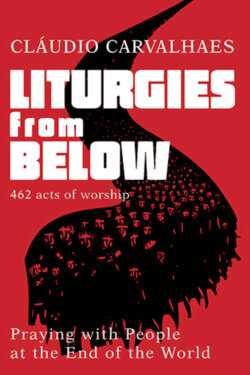Читать книгу Liturgies from Below - UK Edition - Carvalhaes Claudio - Страница 1
На сайте Литреса книга снята с продажи.
ОглавлениеMore Praise for Liturgies from Below
“Liturgies from Below has come to us at a time when racial violence, hunger, migration, and death is on the rise. Rather than rely on the traditional Western canons of liturgical practice and expressions, this book offers a needed corpus of liturgies that will reinvigorate communities of faith to respond faithfully and lovingly to the social and political injustices of this era. For Christian communities seeking to democratize their worship experiences with the voices of those rendered unseen by colonizing elite power, this book is essential.”
—Gregory L. Cuéllar, associate professor of Old Testament/Hebrew Bible, Austin Presbyterian Theological Seminary, Austin, TX
“Liturgies from Below unleashes the subversive and creative power of prayer that destabilizes dominant forms and acts of worship, by praying with the ‘unwanted’ people and the earth. The ‘unwanted’ people who cry out ‘I can’t breathe’ invite us to breathe God’s breath in the world to bring about healing, justice, and restoration. This book, with imagination and creativity, gathers and weaves these prayers from ‘unwanted’ locations and demonstrates that worship can be a system-threatening and therapeutic spiritual and political act that creates counter-imperial alternatives.”
—George Zachariah, Wesley Lecturer in Theological Studies, Trinity Methodist Theological College, Auckland, New Zealand
“This book confronts Empire, not only in its centering of voices, spaces, and places that are often unheard and marginalized but also in its clear acknowledgment that even Western dominant ways of doing theology do not have the last word. The prayers and liturgies contained in this powerful and useful collection embrace the pain and injustice and the joy and beauty of such voices, places, and spaces in a way that affirms and invites the shalom of a God who acts concretely in history. It invites us as readers to do likewise as we stand in prayerful solidarity and sing the songs of freedom together with all who yearn.”
—Nadine Bowers Du Toit, professor of practical theology and missiology, Stellenbosch University, Stellenbosch, South Africa
“What should prayer and worship look like in a world that is seeming more unjust and less hopeful each day? Liturgies from Below shows how worship that occurs in contexts of war, poverty, dehumanization, and hopelessness engenders courage and inspires resistance to oppressive structures. It demonstrates forcefully that worship should never be an exercise that lulls us into indifference, or even worse complacency, to injustices around us, but worship should inspire us to become catalysts for change. An essential resource for every Christian community that seeks to worship faithfully and live out its calling as people committed to justice.”
—Raj Nadella, Samuel A. Cartledge Associate Professor of New Testament, Columbia Theological Seminary, Decatur, GA
“Liturgies from Below touches the mind, stirs the heart, and ennobles the spirit within us all. With a myriad of liturgical styles and emphases, there is something for everyone in this impactful worship resource. Minority and poor communities will find words that leap from the heart of their very existence. Majority and affluent communities will find prophetic challenges so compellingly penned it will move them to examine deeply held assumptions of wealth and privilege.”
—B. J. Beu, worship and preaching consultant, co-editor of The Abingdon Worship Annual from Abingdon Press
“The seeming ordinariness of a traditional book of prayers is quickly disrupted by the invasive smells, noisy hustle, fears and exuberance, cardboard houses, and ready-to-eat meals of global city streets. These street prayers reek of the aroma of Christ.”
—Steed Vernyl Davidson, professor of Hebrew Bible/Old Testament, vice president of academic affairs, and dean of the faculty, McCormick Theological Seminary, Chicago, IL
“Christian prayer is a participation in the ongoing, eternal intercession of Jesus the Christ before his Father. As we participate in Jesus’ prayer, we gain God’s heart for the entire created order—and in particular for the poor, the marginalized, the innocent, the oppressed, the sick, the dying. But, as Liturgies from Below makes clear, we also come to the realization of our own complicity in perpetuating evil and oppressive systems of thought, politics, economics, behaviors, and activities that militate against the kingdom of Christ, and we are led to a place of metanoia, or repentance. That change of heart by the Spirit of God working in us, is the only real hope of the world, but a hope rooted in God’s love for the entire created order. I commend these prayers as they participate in the prayer of the Savior for the ‘least of these.’ ”
—James R. Hart, President, Robert E. Webber Institute for Worship Studies, Jacksonville, FL
“Liturgies from Below invites readers on a vital journey to pray with people ‘at the ends of the world’ and, as one of the prayers says, ‘to step into their lives.’ Continually yielding insight, often deeply moving, not always easy, and sometimes searing, Liturgies from Below powerfully implores that when we ‘raise our hands in prayer’ we need to ‘use those hands to help.’ ”
—Stephen Burns, professor of liturgical and practical theology, Pilgrim Theological College, University of Divinity, Melbourne, Australia
“This is a priceless resource. We can no longer be satisfied praying the prayers that we know; we must instead begin to pray in a way that can ‘heal, recuperate, reconfigure, restore, and restitute our communities, the earth, and our social-natural systems.’ ”
—Vinnie Zarletti, Director, School of Worship Arts, North Central University, Minneapolis, MN
“Cláudio Carvalhaes has gathered a great variety of prayers for many occasions. Some fit classical liturgical settings and are offered for specific concerns. The collection will inspire leaders to facilitate liturgical creativity and lament, and it will help people resist authoritarian cultures of repression and capitalist structures of exploitation.”
—Marion Grau, professor of systematic theology, ecumenism, and missiology; research fellow, Norwegian School of Theology, Religion and Society, Oslo, Norway
